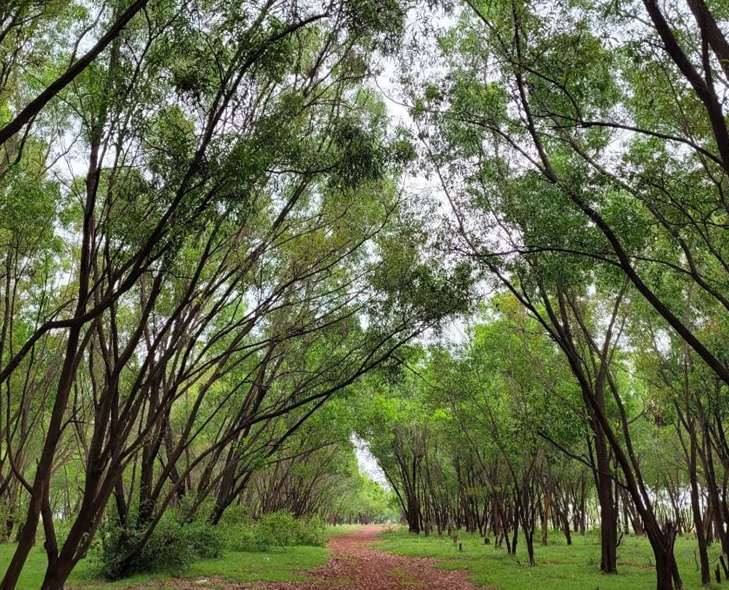By Meera Bhardwaj :
With Greater Hesaraghatta Grasslands Conservation Reserve issue on the agenda of Wildlife Board meeting on November 3, activists up the ante for its formation to give Bengaluru, the much-needed protection for its water resources and biodiversity. The Karnataka State Wildlife Board will be taking up the matter once again in the aftermath of Karnataka High Court’s directions for reconsideration as the proposal was rejected in 2021 under the chairmanship of B S Yeddyurappa.
The formation of a “Conservation Reserve” in no way alters the rights of the farmers or the citizens using this area for their needs, say experts.
Let us consider the Jayamangali Blackbuck Conservation Reserve in Madhugiri, Tumakuru district.

This is one such shining example – farmers and black bucks live happily without any conflict and share the space with another.

One can see hundreds of cattle grazing peacefully and farmers tending them in this beautiful grassland of Jayamangali whose formation as a conservation reserve has in no way affected their needs for fodder or water.
Environmentalists of Bengaluru question, “So, where is the need to oppose the formation of a conservation reserve in Hesaraghatta? Vested interest and elected representatives are misleading the farmers and residents and claiming that it would affect their lives. It is shocking, none of the MPs or MLAs of Bengaluru have come forward on this issue or evinced any interest as the formation of Greater Hesaraghatta Grasslands Conservation Reserve means protection of the catchment area of River Arkavathy and its unique biodiversity.

“These grasslands, in turn, is a food source for local wildlife and animal husbandry livestock. Further, it acts as a flood mitigation land bank,” say activists and activist groups leading the Save Hesaraghatta Campaign.

According to scientists and researchers who have studied this habitat, Hesaraghatta has a unique biodiversity as it is a “freshwater wetland-grassland-marshland.

This type of habitat is critically endangered. Home to native and rare flora and fauna, it is considered the best, biodiversity hotspot of Bengaluru. Scientists study has revealed the presence of 235 bird species (that includes lesser floricans, winter migrants and raptors) and a plethora of different species of insects, butterflies, amphibians, reptiles, and mammals.

Many individuals, concerned citizens, NGOs, agro-based companies, resident welfare associations, environmentalists have been running a relentless campaign to Save Hesaraghatta and have held volunteer meetings, signature campaigns. They have been using the social media and holding meets to bring awareness in the minds of people to save the 5010 acres of Hesaraghatta grasslands, scrub forests and wetlands from diversion for urban profit-making projects.
“The grasslands can cater to the fodder needs of many indigenous cattle and in turn, build soil with the help of planned holistic grazing. If developed well, it can be a model for grazers all over India to understand the deep science of grazing,” says another volunteer who is supporting the campaign whole heartedly.

Further, for the first time, in nearly three decades, the Hesaraghatta Lake which once catered to the drinking water needs of Bengaluru, is filled to the brim.
Spread over an area of 1100 acres, the Hesaraghatta Lake filled up due to heavy rains in the catchment area of river Arkavathy. The water body had lost its potential due to rampant sand mining, stone quarrying, degradation of catchment area (in and around Nandi Hills), encroachments and erosion. The Hesaraghatta lakebed had turned into a grazing land while the government had failed to restore the lake.
With heavy rains lashing this year, excess water from some 180 lakes flowed into the Hesaraghatta Lake unabated and attracting people to wonder about the capacity of this lake. So, if this water body must be protected and rejuvenated, the unique grasslands around this lake too needs to be conserved, add activists.

In the background of global warming and climate change and the city of Bengaluru facing both floods and water scarcity and formation of heat islands in many areas of the city, it becomes imperative on the part of the state government to allow the formation of the Conservation Reserve and also rejuvenate this lake which once served the water needs of the city, activists add.

